MATTERS OF THE ART
Does visual activist Zanele Muholi also dream of a Barbie world?
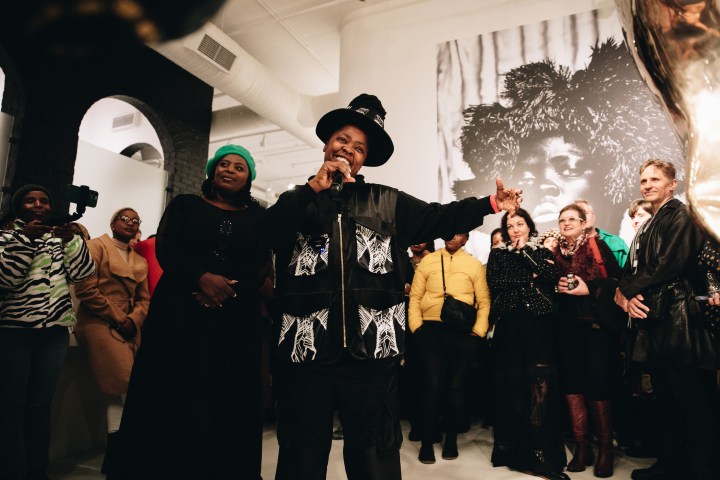
‘I’m a Barbie girl, in the Barbie world. Life in plastic, it’s fantastic. You can brush my hair, undress me everywhere.’ Thus go the lyrics to the bubblegum pop song by Aqua. But what about the real world of gender-based violence, femicide, lesbian exclusion and corrective rape? A solo exhibition by visual activist Zanele Muholi poses these questions.
Can’t say Barbie’s ever been my thing. Ryan Gosling is more my type. After all, as his Alpha-male character in Crazy, Stupid, Love made blatantly clear during a scene in a towel-optional men’s sauna with Steve Carell (“My schwanz is in your face…”), Gosling has all his man bits. Unlike Barbie’s Ken who, let’s face it, was specifically designed to be anatomically incomplete.
After all, Mattel never intended the Barbie universe to initiate conversations around gender. Never mind genitalia and reproductive rights. Hell, they never even intended for Ken to become a gay icon.
Some of these conversations have nevertheless been unfolding in response to Greta Gerwig’s bright-pink blockbuster comedy, of course. The debates have primarily happened in the realm of philosophical chitchat in the media, where critics and experts have weighed in on the extent to which the film fits into the current discourse on feminism. Because the question remains: why, after decades of progress in the area of gender equality, do women (and gender non-conforming people) continue to be treated as second-class citizens (or worse)?
Even Ken has been grappling with the question. In fact, it’s not the first time Gosling’s been on screen with a plastic girlfriend for a sidekick. Remember Lars and the Real Girl? In that film, he orders a sex doll named Bianca off a website. And while it is confirmed by Lars’s pregnant sister-in-law that Bianca is indeed anatomically “accurate”, she and Lars never in fact consummate their relationship.
Muholi’s huge anatomical depiction of a clitoris, titled Ncinda, is effectively the transformation of a social taboo into an object of visual sensuality – a kind of answer to the proliferation of male genitalia in public spaces, from bathroom walls to casually distributed dick pics.
Someone else who has long grappled with such issues and who works far from Hollywood, on the other side of the culture spectrum in a far less entertainment-focused realm of visual activism, is Zanele Muholi.
Currently ranked as the most important person from Africa working in the contemporary art world, Muholi uses the pronouns “they/them” and has for more than 20 years been taking pictures of marginalised people, mostly black lesbians who have been victims of gender-based hate crimes such as corrective rape.
Globally renowned, from Africa
Muholi has also created a continuously expanding body of self-portraiture that has become globally renowned and is included among the collections of some of the world’s most important art galleries and museums. Entitled Somnyama Ngonyama (“Hail the Dark Lioness”), this series of black and white photographs, created using everyday objects turned into jewellery and adornments, has made Muholi a superstar within the realm of fine-art photography.
Muholi’s photographs sell at auction for thousands of dollars, but what motivates them is the cause of social justice; they feel compelled to create work that acts as a mirror up to the world, that poses questions about our shared humanity. Much of the questioning that arises in response to their work deals with the rights of women and members of the LGBTQI+ community – people Muholi believes continue to live in the shadows in many parts of the world.
While it is Muholi’s photography that has captured the art world’s attention for two decades, they have more recently added a series of breathtaking sculptures to their repertoire. The first showing of these three-dimensional bronzes currently forms part of an exhibition at Southern Guild, a gallery at the V&A Waterfront’s Silo District in Cape Town.
While it was par for the course for Barbie to ignore anatomical factuality, Muholi’s eponymous solo show is significant for its frank depiction of female sexual organs: among the works are sculptures of a uterus, a clitoris and a vagina. Each of these is rendered with the utmost sanctity. Their purpose, according to the artist, is to make them the focus of awe and veneration. And to spark conversation.
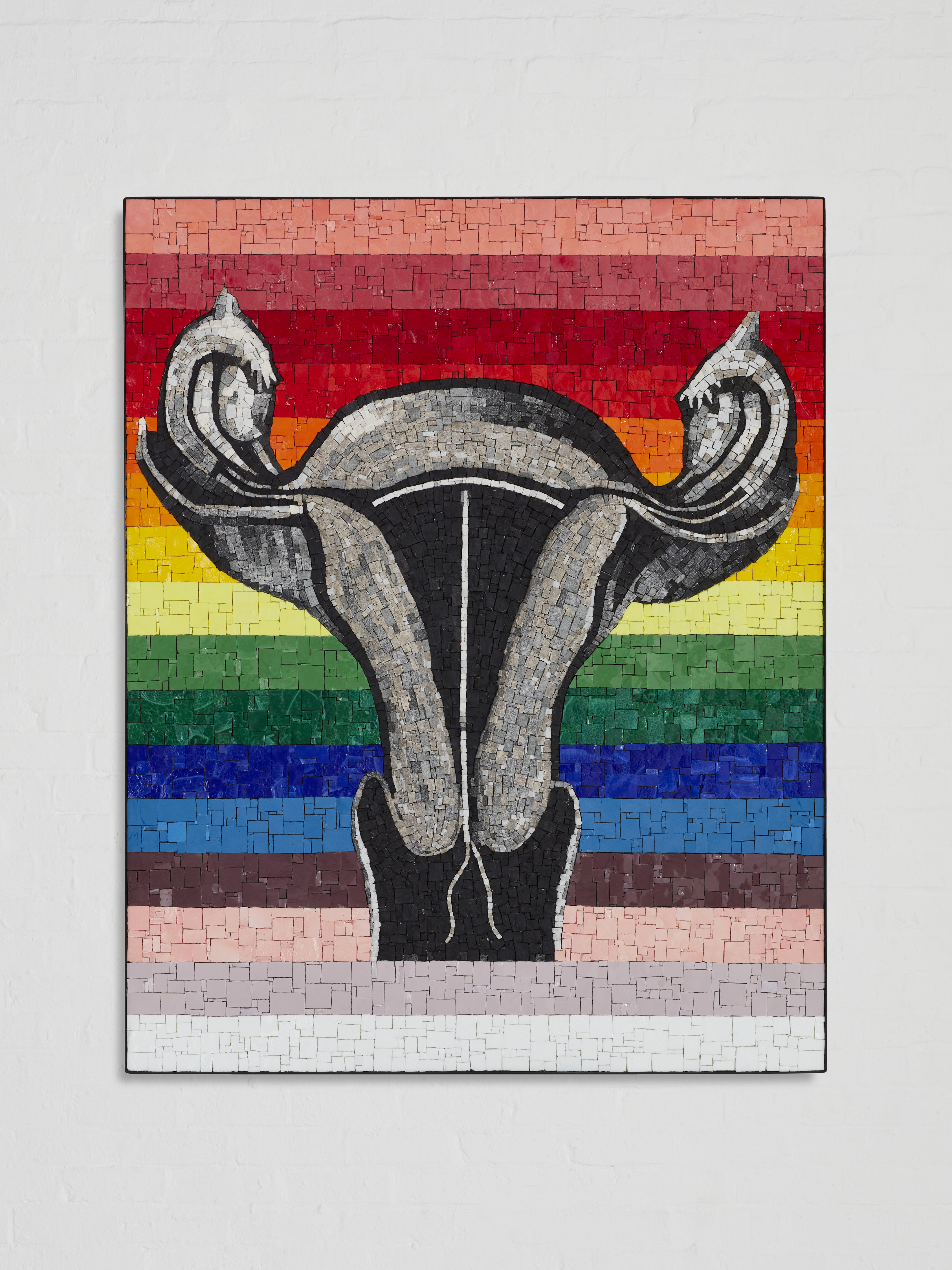
‘Thwele ubunzima (An Ode to Mothers of Queer Children)’ at Southern Guild. (Photo: Hayden Phipps)
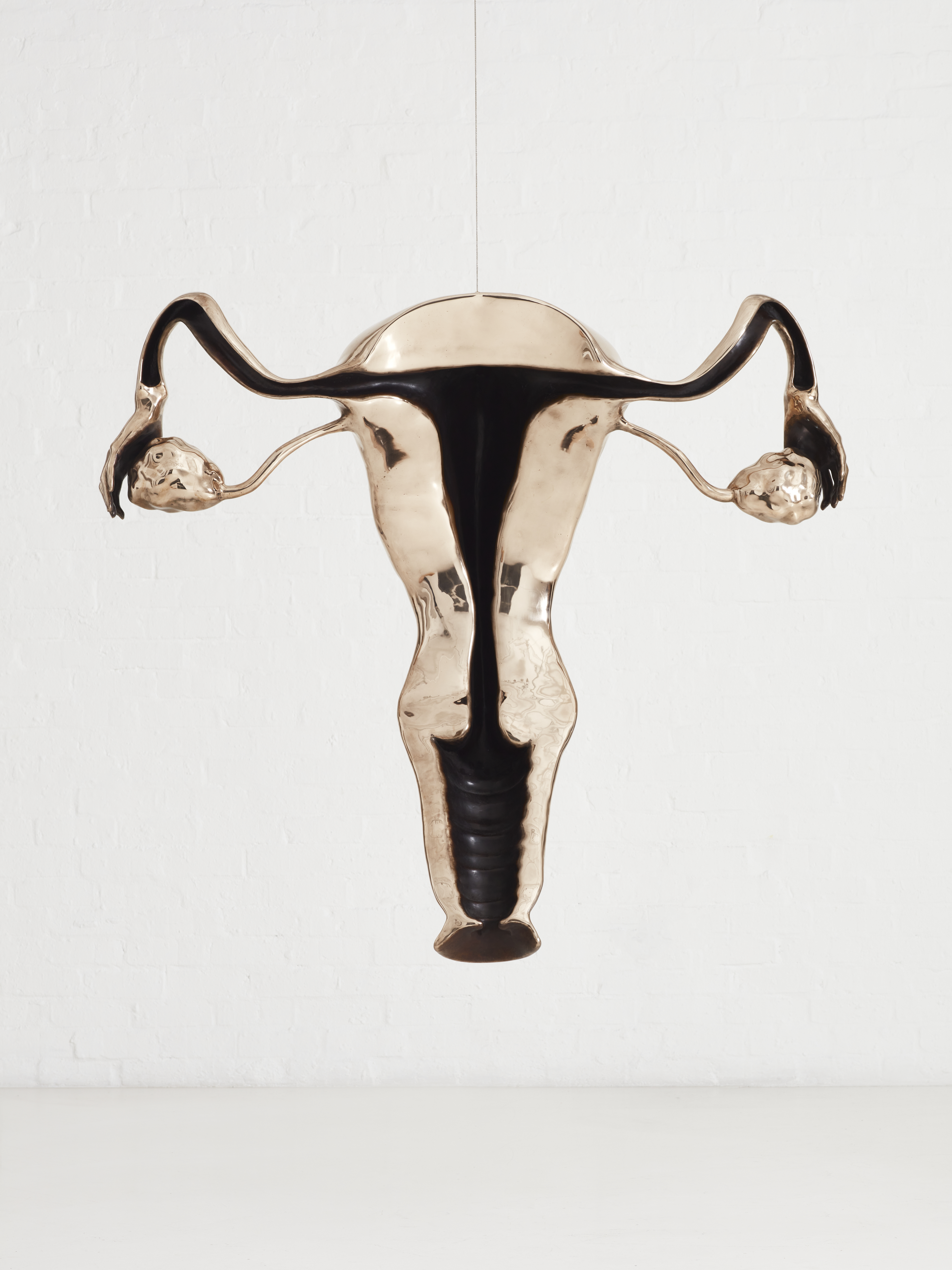
‘Umphathi (The One Who Carries)’ at Zanele Muholi’s solo show. (Photo: Hayden Phipps)
Their intention – epitomised by a huge, gleaming bronze uterus suspended from the ceiling so that it can be observed from all angles – is to deify and bring honour to parts of the female body that society has tended to turn into taboo. By compelling you to stare, marvel at their beauty, take in the details, Muholi reverses such taboos: organs that throughout history have been made the focus of shame, violence and misinformation, are instead glorified.
Muholi’s huge anatomical depiction of a clitoris, titled Ncinda, is effectively the transformation of a social taboo into an object of visual sensuality – a kind of answer to the proliferation of male genitalia in public spaces, from bathroom walls to casually distributed dick pics.
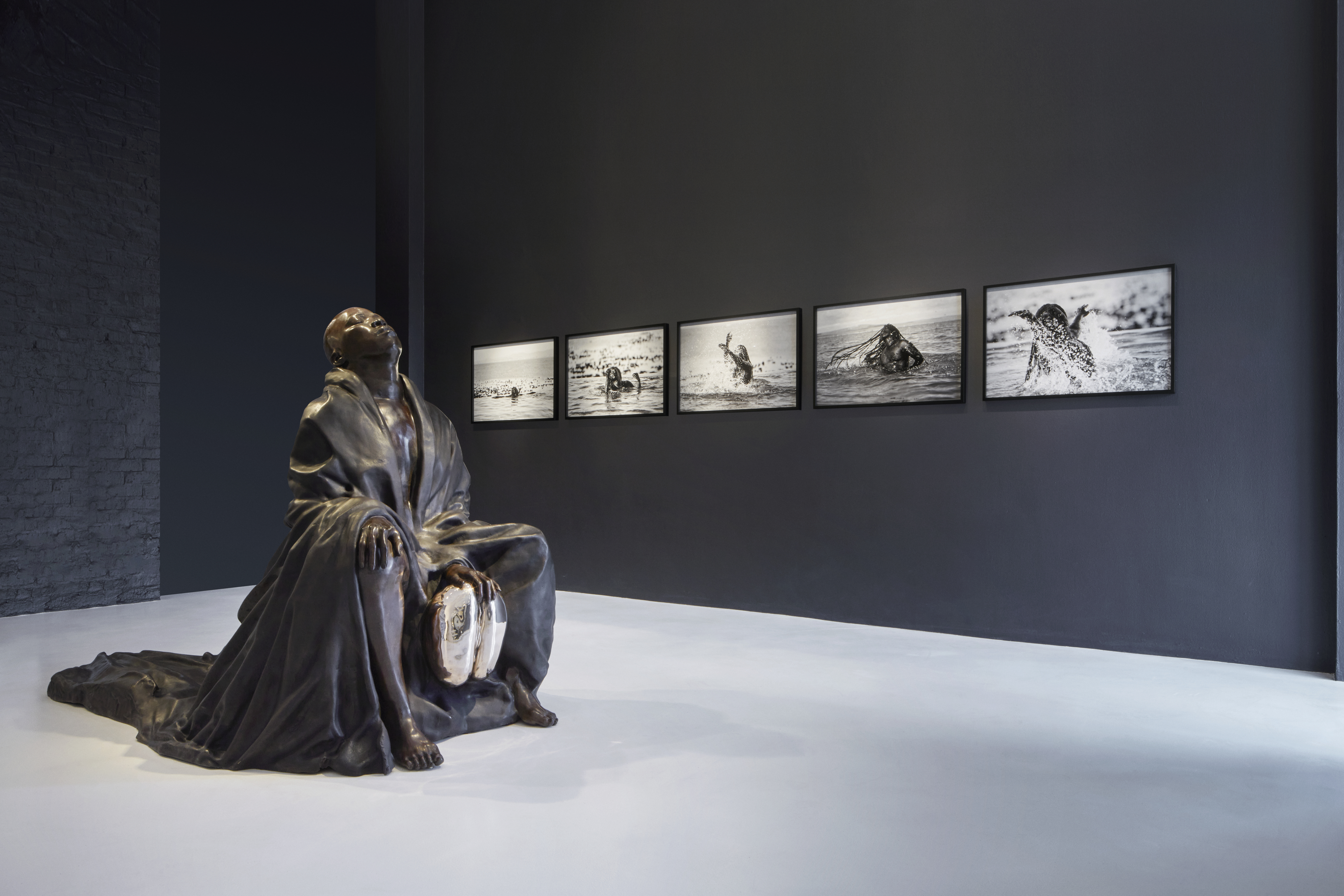
‘Being’ with photographs from the ‘Manzi’ series, at Zanele Muholi’s solo show . (Photo: Hayden Phipps)
A call to bring the hidden into the open
Muholi’s sculptures are a call to bring the hidden into the open, and to get women and girls, men and boys talking – openly and honestly, candidly and graciously – about women’s bodies. Of concern is the issue of representation: how female bodies are disclosed, how they are treated, and what our relationship to these bodies is. Muholi says the problem is that women’s bodies continue to be discussed as part of a patriarchal, colonial, heteronormative discourse.
“The most intimate part of a woman’s body is used to vilify her,” says Muholi. “There are so many insults related to the vagina, in every language. It is associated with weakness, with shame, with being dirty. I want us to have real conversations about women’s bodies based on respect and without apology. This is the most sacred place – the passage through which new life enters the world.”
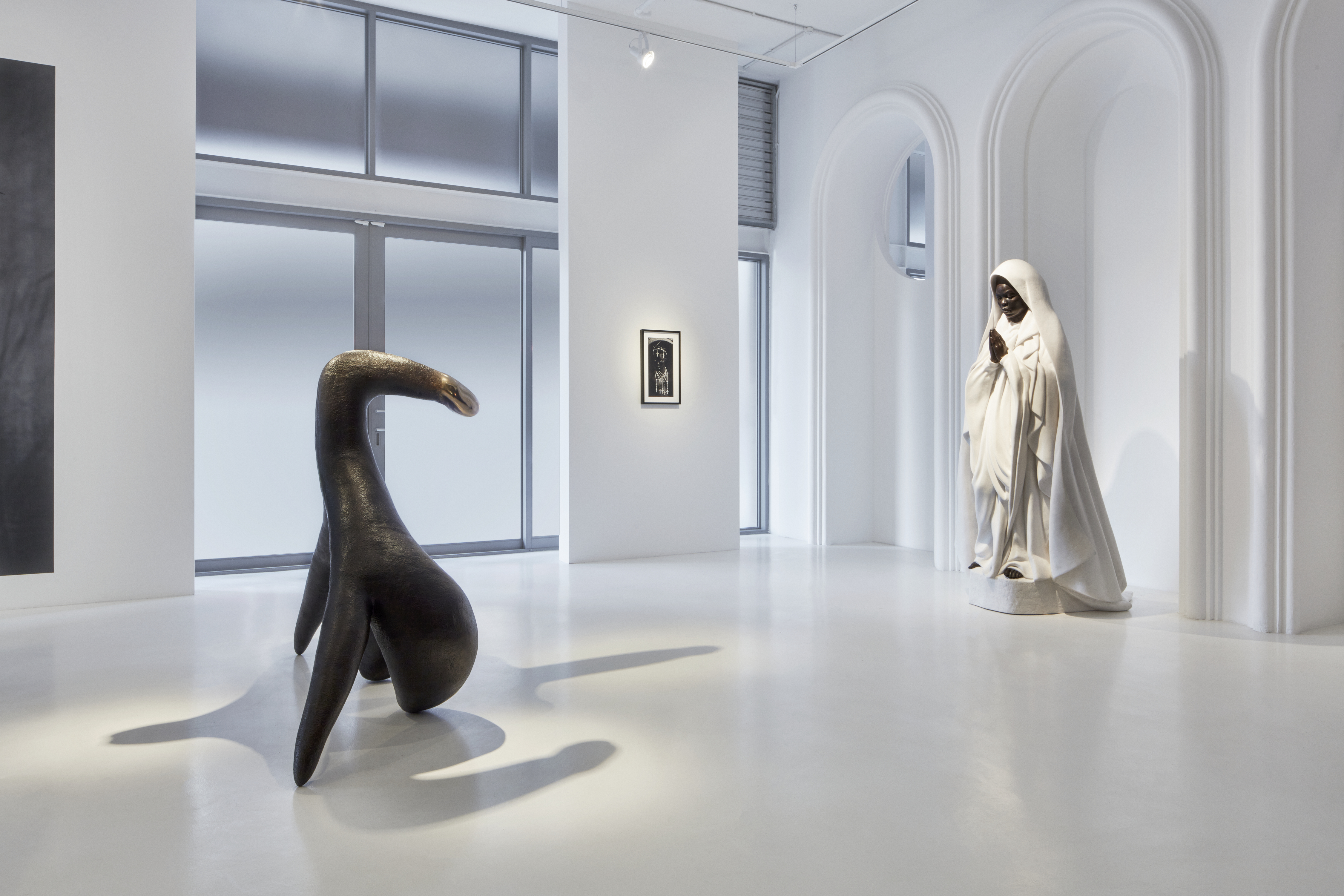
‘Ncinda’ and ‘Umkhuseli (The Protector)’ at Zanele Muholi’s show at Southern Guild. (Photo: Hayden Phipps)
Muholi, at a pre-opening of the show in mid-June, talked about the extremely personal nature of the work, about the hurtful experience of being interrogated by a female gynaecologist, asked inappropriate questions that were fuelled by assumptions about how women “of a certain age” are meant to be, about when and with whom they are meant to have babies, and about who their partners are meant to be. For Muholi, this was a form of homophobia – the presumption of heteronormativity – that continues to be ingrained, even in the language of medical science.
Their sculptures of female sexual organs are not the only three-dimensional manifestations of Muholi’s attempt to get people talking about women’s rights. There is a life-size statue of Muholi as a black Madonna, dressed in white and at prayer that reckons with the artist’s Catholic upbringing. “The prayer always starts, ‘Our Father…’,” says Muholi. “But what about ‘Our Mother’?”
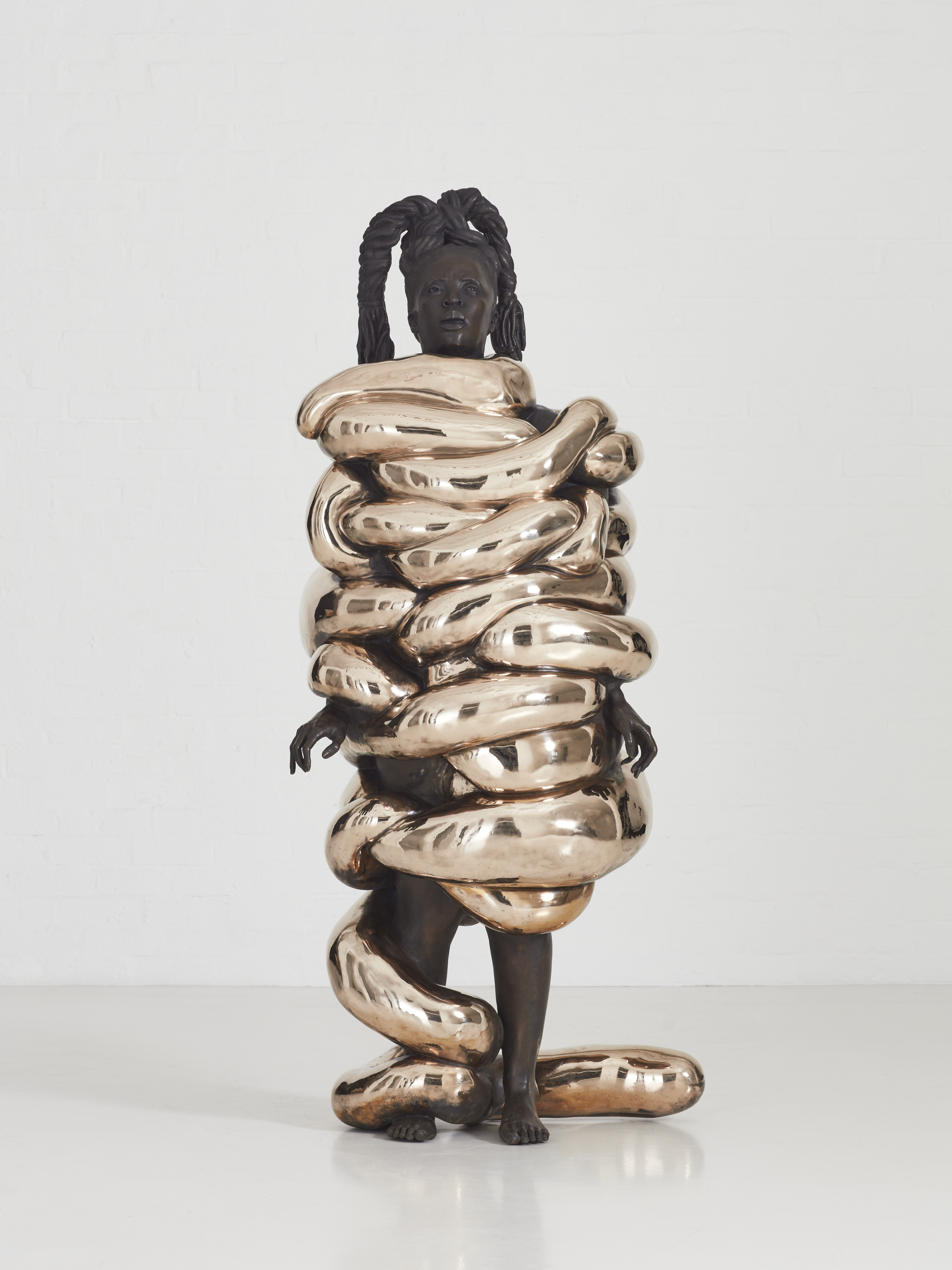
‘Bambatha I’ at Zanele Muholi’s solo Southern Guild show. (Photo: Hayden Phipps)
Bambatha I is a sculpture of a youthful version of Muholi wrapped in what might be a python, a suffocating snakelike thing that is either embracing or strangling the child within. Muholi says that it is an evocation of the many stories of women and girls found murdered, too-numerous tales of women who have been stripped of life, violated, dismembered, and who have had their innards pulled from their bodies. They are stories of gender-based violence and killing so terrible that Muholi seemed almost to enter an emotional trance as they spoke about them, overcome by empathy, overwhelmed by frustration that such crimes against women and children continue.
This is not to suggest that there is any shame in spending a couple of hours in a Barbie world. If only the real world in which women and men co-exist could be quite so fantastic.
Read more in Daily Maverick: Welcome to Barbieland, where not everything is perfect as it seems
That’s Zanele Muholi’s dream, I guess, albeit without the taboos, without the shaming of lust and sexual pleasure, and with an acceptance of personal freedom, accompanied by a far deeper understanding of – and respect for –the biological processes of other people.
Until that far-fetched dream is realised, Muholi will continue to work with obsessive dedication. Put on this Earth to shine a light on those who have, for too long, been hidden in the shadows, their work will continue with a tirelessness and energy that seems to know no limit. Fatigue, exhaustion, burnout – Muholi says there is little time for such things, that they cannot allow their work to be interrupted, that there is still so much to be done. DM
Zanele Muholi, an eponymous solo exhibition by the renowned visual activist, is showing at Southern Guild, Cape Town, until 16 August. See southernguild.co.za





 Become an Insider
Become an Insider
Thank you Keith Bain for this beautifully written and enlightning article on the amazing Zanele Muholi and their incredible work. Wow! As a Christian I thank God for Zanele’s talents and activist mind. Through them we see reverence, beauty and respect for those parts of the body that are responsible for nurturing each one of us into the world. That it takes someone from the LGBTQI+ community to bring us this respect for our sacred female bodies makes me as a woman ashamed to have bought into the traditional male dominated degrading of our reproductive organs. My mind is changed for ever by this amazing artists work. I shall follow them with interest and awe. God makes no mistakes when he creates his children.